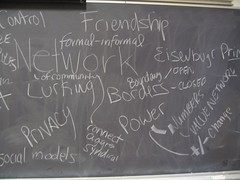 My last post was on the ground, in-the-flow practical stuff of online community management in response to Chris Brogan’s great post, On Managing A Community . This one climbs up to meta-ville a bit and asks a couple of questions.
My last post was on the ground, in-the-flow practical stuff of online community management in response to Chris Brogan’s great post, On Managing A Community . This one climbs up to meta-ville a bit and asks a couple of questions.
Are we talking about communities, or are we embarking on the era of network facilitation?
If you read between the lines and through the comments on Chris’s blog I think he has begun to tease out some of the differences between community and network management! (I’ll come back to that word “management.”) Read through his goals which I think are different than what we have come to expect for what I’ll call “traditional online community management.” In the past this has been about the inward set of processes around hosting, moderation and facilitation of web based discussion communities – large or small. He speaks of outreach, of reputation of an organization in the world, and of mechanisms of learn from and with groups of people and even the wider world. It is an outward looking role, not inward. It is about spawning connections, not keeping existing connections organized.
This is not your mother’s discussion board, sweetheart!
When we move to the network, a couple of things happen. The notion of managing becomes even more of an illusion than managing that herd of cats called “community.” (By community, I mean a bounded set of individuals who care about something and who know they are members and interact with each other over time.)
Instead we are talking about scanning for things important for our organizations – conversations about us, niches or needs we can fill, feedback and suggestions for improving what we do. It is filtering and redirecting those messages to where they can do good. It is a little bit like listening to the universe.
Instead of managing conflict or spammers in a walled community, we are seeking to make connections between people that advance our organization’s learning and goals. That includes between disgruntled people and the people who might address that problem, between ideas, links and content to people who might use them, and between communities that exist within the humus of the network garden.
Instead of spawning or archiving threads, we are tagging and remixing. Instead of inviting in or kicking out members, we are mapping the network of relationships, looking for where to respond, and where to catalyze action.
These are not the list of community management skills we have come to know since the first big upswing in online communities in the mid 1990’s. We have moved to from community to network…. what is the word?
If we are talking about communities, are we really talking about managers?
I don’t think it is management in the traditional sense, in the sense of control and mold (or even “facilipulate” – manipulate+facilitate!). It is about sensing, scanning, filtering and connecting. And, it is about learning. Facilitating learning. Living the learning and creating the next iteration of that learning. It is about stewarding technology as wave upon wave of new tools crashes upon our organizations.
It is about weaving between the community and the network.
What the heck would this job be called? Which organizations have the foresight to invest in it — and realize that those who help them weave their organizations in and out of the networks will benefit most from those networks? If we were looking for this person, what skills would they show up with? What would their traces across the internet look like?
 I’m back from over three weeks of travel in Europe and I realized that if I didn’t sit down and write at least one blog post, no matter how trite or incomplete, I will have gone nearly a month without a blog post and I’ve not done that since I started this blog (over on it’s original blogger home) in 2004. The fact that I missed my own blogaversary in May this year tells you that blogging has simply become part of the fabric of my work and life, and yet this gap… oi! I have tons of drafted posts and lots of things that I “planned” to blog about, but time has been tight.
I’m back from over three weeks of travel in Europe and I realized that if I didn’t sit down and write at least one blog post, no matter how trite or incomplete, I will have gone nearly a month without a blog post and I’ve not done that since I started this blog (over on it’s original blogger home) in 2004. The fact that I missed my own blogaversary in May this year tells you that blogging has simply become part of the fabric of my work and life, and yet this gap… oi! I have tons of drafted posts and lots of things that I “planned” to blog about, but time has been tight.
 I haven’t read through this report in detail, but I wanted to blog it to get it wider visibility because the sharing the learnings from our community activities is an important (and appreciated) contribution to improving our practices. IN this case – about doing online events for our communities of practice. Check it out —
I haven’t read through this report in detail, but I wanted to blog it to get it wider visibility because the sharing the learnings from our community activities is an important (and appreciated) contribution to improving our practices. IN this case – about doing online events for our communities of practice. Check it out — 